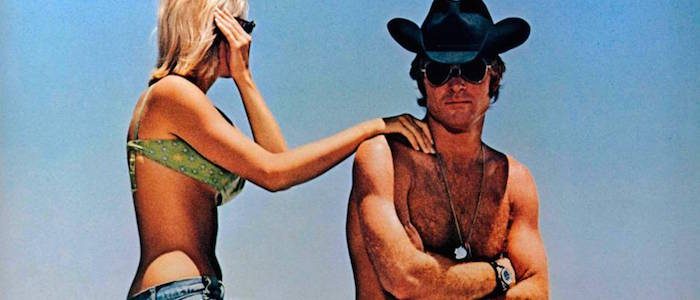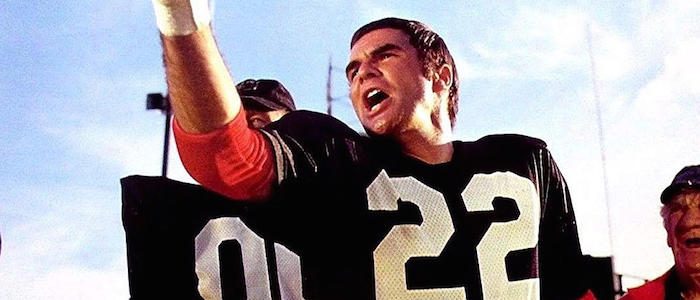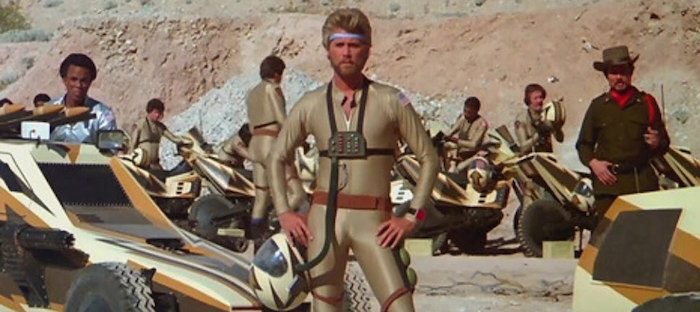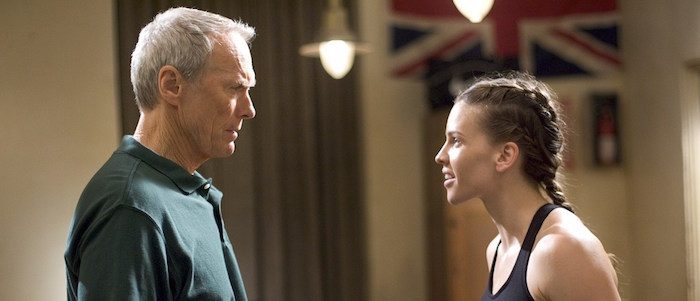A few days ago, we spoke with legendary producer Al Ruddy about the making of The Godfather, Ladybugs and Megaforce (which the gang at How Did This Get Made? covered in their most recent episode).
Today, in Part 2, we continue our epic discussion with Al Ruddy—this time talking about Million Dollar Baby, Little Fauss and Big Halsy and The Longest Yard…
4. MILLION DOLLAR BABY (2004)
AL RUDDY: I did a movie with Clint Eastwood called Million Dollar Baby. It was from a collection of short stories called Rope Burns.
BJH: Yeah. Let’s talk about that. You mentioned to me the other during that—early on—your wife had said something to you like: who’d want to see a movie about a female boxer?!
AL RUDDY: [A female boxer] who dies! Who sees movies with women boxers anyway? You ever been to a boxing match with women? That’s a fucking sicko!
BJH: Well what appealed to you, from the early stages?
AL RUDDY: Now, I’ll show you how it happened. Anjelica Huston is a friend of mine. Or she was a friend of mine (you’ll see why in a minute). She calls me up and says, “I read one of the most beautiful things I’ve ever read in my life. I want you to read it because I’d like you to produce it and I’ll direct it.” I said, “Okay, Anjelica, fine. I’ll read this fucking thing.” I swear: I had tears coming down my face. When I read it. That’s how fucking touched I was by it. So I make a deal with Anjelica and we’re gonna get a writer and she is going to direct it. Well, before I had my writer in tow she calls me up and says, “I hate to do this to you, but Julia Roberts just called me and she offered me a firm pay or play to write and direct a movie with her; so I have to leave Million Dollar Baby.”
BJH: Okay.
AL RUDDY: Well, by this point I had—I’m not exaggerating—[invested] about $100,000 in this thing. And then I was left with a little story (about 35-40 pages of a short story) and no director. And I had my dick in my hand….but when I read [the short story on which the project was based], I was so touched by it. I could tell that story at a party and I’d have people crying. I’m serious. People said, “Why don’t you get it made?” I said, “I’m trying to get it made!” So the next part of the story, I’m going to leave the star out because I don’t want any recriminations.
BJH: Sure.
AL RUDDY: One of the major, major female stars in the business—she’s with CAA—they call up and they want to know if I’ll make a deal with her. Are you kidding? [laughs] So now I take meetings with her and she is maybe one of the nicest people I’ve ever met in Hollywood. We spent time talking about directors and what we want to do. I’m falling in love with this woman, she’s so fucking great. Then one day we’re having lunch and she says, “Oh, good news.” I said, “What?” She said, “We have a director.” Hmmm. I said, “Who is it?” She said, “Shekhar Kapur.” I said, “Shekhar Kapur, the fucking Indian in London who just did Five Feathers [Ruddy is referring to The Four Feathers]? How the fuck is he going to do a boxing movie?” She said, “No, no, no. He really understands it.” So then she shows me the Telex that he sent her—his analysis of the script.
BJH: Okay.
AL RUDDY: First of all, no one has ever written the perfect script so there’s always something you can write. So I go through that without any chagrin. But then I get to a middle paragraph that is burning a hole in my eye. “The main problem with this property is that as a female athlete, no one has taken your menstrual cycle into effect.” You have never seen anyone go crazy like I do.
BJH: Ha.
AL RUDDY: I threw it across the fucking table…I said, “Listen, you tell [CAA agent] Brian Lourd that if I ever see Shekhar Kapur near my office I will kill him. Do you understand? He will be a dead man. I get a call from her agent [Brian Lourd]. He said, “What the fuck’s your problem? What kind of a fucking producer are you? You’re gonna walk away from a $1.5-2 million because you don’t like the director?” I said, “You know, Brian, you got it wrong. It’s not that I don’t like the director, I like my material. I love it. And he can’t make the movie I want to make.” Well, I was persona non grata at CAA. For about 5 months. They thought I was crazy.
BJH: [laugh]
AL RUDDY: So I was in Sun Valley about two months after that and then I was with Clint [Eastwood]. And I said, “Do you want to read this script?” He said, “Yeah, yeah.” Then I see hm the next morning. He said, “Jesus Christ. It’s a great script, but it’s such a fucking downer.” I said, “Clint, it’s okay to have a downer, or a laugher—just don’t be in between.” It’s good to cry and it’s good to laugh. Just don’t be disinteresting.”
BJH: That’s wonderful.
AL RUDDY: That’s how that movie got made: AGAINST. ALL. ODDS. I kept keeping the option alive; keeping the option alive; keeping the option alive; ‘cause I wouldn’t let it go. When I develop a piece of material (and I’ve developed almost everything I’ve done) it becomes very personal with me, you know?
BJH: Sure.
AL RUDDY: I have a script that I’ve had for 25 years. Called Cry Macho. And I was at a birthday party for me—with Arnold and Clint—and Clint says, “Is there anyone at this party that has never had Cry Macho in their hands?” I gave it to everyone in Hollywood. And everyone starts laughing. It doesn’t matter.
BJH: That’s so funny.
AL RUDDY: If you believe… [restarting] what’s missing today in the business is too bad. Today it’s become Comcast and all the big networks; and the movie business is slowly dying. If you’re a producer and it’s yours: YOU. MUST. GET. IT. MADE. It’s your responsibility. However you get it made. There is no easy way to get it made. Look, if you’re Steven Spielberg: of course! But for 90% of producers in this business—and believe me when I tell you: I’m by far one of the most successful…[rephrasing] when I do something, I keep it fucking going if it’s the last thing I’ve ever done. And I will not stop. You know?

5. LITTLE FAUSS AND BIG HALSY (1970)
AL RUDDY: When I started at Paramount I got in there because I’d done Hogan’s Heroes, right? And they think you’re a genius. So I wanna do this movie on motorcycle racing and I hire a writer named Charles Eastman, who is the hottest writer in Hollywood, and particularly known for the fact that no one owned a Charles Eastman script. He wouldn’t sell the scripts to anybody.
BJH: Wait, what does that mean? What did he do—license [his scripts] or something?
AL RUDDY: No, he was just a guy; he owned 3 or 4 screenplays and didn’t trust most people. He actually wanted to direct everything he wrote, but no one gave him a break.
BJH: Oh, okay. Gotcha.
AL RUDDY: So I make a deal with Charlie and he goes off to do research on motorcycle racing and is going to Daytona for the big finale of the movie. Of course, he never gets there. He ends up in Texas and he’s terrified that people are gonna shoot him. Guys with pick-up-trucks and guns. And he’s got his police dog, Boris, in the back. And Charlie calls me and says, “I can’t go on. America’s having a nervous breakdown.” I remember this—this was three weeks before John F. Kennedy was shot. [Charlie said] “I can’t stay here, I can’t stay here, I’m coming back!” I said, “Come back, Charlie, it’s okay.” So now his agent calls me. He says, “Al, listen, Charlie just can’t write it anymore. He just can’t crack it.” Now, I had [already] given him half his money from the studio: $40,000. And he’d get $40,000 when he completes. So now I’m $40,000 down with no script. On my first assignment!
BJH: Ha!
AL RUDDY: So I told Mike (his agent); I said, “You can tell Charlie he’s off the movie, okay? I understand that. But at least come in as a friend and end the relationship as buddies.” He said, “You mean that?” I said, “Yeah, absolutely.” About an hour later, Charlie calls [and says] “Oh, I’m so glad you understand.” Sure, come in tomorrow. We’ll have a cup of coffee. And we’ll find something else we can do. “Oh, great!” He’s coming in the next morning, so I go down to the head of Business Affairs, Art Ryan. I said, “Art, Charlie is gonna give me the script in the next couple of days and I need the final check for $40,000.” He said, “No, no, we can’t pay for the final until we all get the script.” I said, “Art, he needs the fucking money. Give me a goddamn check; you’ll get the fucking script.” He gives me the $40,000 check—[cutting himself off] I could have actually gone to jail for this…
BJH: Oh, jeez…
AL RUDDY: So the next morning Charlie comes in with his police dog. I said, “Charlie, I know how hard you tried. And I want you to have this.” I take out the $40,000 check. I’ll never forget as long as I live. He says, “I can’t take this!” I said, “I insist!” He had on a beige corduroy jacket. I push it in his fucking pocket. I said, “Take the fucking check and go. Somewhere down the road we’ll get together on another deal, Charlie.” He walked out, he didn’t know what to say. He walked out with his police dog.
BJH: Amazing.
AL RUDDY: So that was Tuesday. On Saturday, I’m at home watching football and my doorbell rings and my wife goes to the door. She comes upstairs and says, “Some guy named Charlie Eastman [is here].” I said, “Oh, really?” So Charlie comes in. He’s in a raincoat because it’s been raining outside. Under his arm he has an envelope. He said, “Look, I felt so guilty—what I had done to you—it opened me up and I went to Palm Springs and I wrote the script in 4 days.”
BJH: [laughing]
AL RUDDY: Now, I said I couldn’t fucking believe what happened. I couldn’t fucking believe it! He gives me this great fucking screenplay (that got wrecked by the director; there’s another story); so I called…now, Bob Redford loved Charlie Eastman, I knew that. But he won’t do a movie at Paramount because there’s a movie they want him to do (which he won’t do). So he owes them a movie. He’s doing Butch Cassidy down in Cuernavaca, Mexico, alright?
BJH: Yeah.
AL RUDDY: [At that time] I’m just a new schmuck on the lot! So I tell my secretary: let’s call…get information from Cuernavaca and get the best hotel. And ask for Bob Redford. She says, “I’m sure Bob Redford will run for the phone when he hears your name.”
BJH: Ha!
AL RUDDY: So she calls up and then says, “It’s Bob Redford on the line! It’s Bob Redford!” I pick up the phone and I say, “Hey, my name’s Al Ruddy, at Paramount. I have a Charles Eastman script.” He said, “I love Charlie…hey, listen: why don’t you send me the script? I can read it down here.” I said, “Would you read it if I brang the script down myself?” You want to come down here to Cuernavaca to have me read the script? I said, “Yeah, if you’ll read it right away.” He says, “Well, when do you want to come down?” I said, “Tomorrow.”
BJH: Tomorrow? That’s great.
AL RUDDY: He said, “Okay, well come down tomorrow, we’ll have dinner and then I’ll read it in the morning.” I go to Mexico City, I drive 150 miles down this crazy fucking road to this little town, just as Paul Newman and George Roy Hill come off location. So I shake Bob’s hands, we go and we have dinner. He said, “I’ll read the script by breakfast.” I said, “Okay.” I meet him at breakfast time and he says, “this is one of the best script I’ve ever had. I’ll do the movie.”
BJH: Wow.
AL RUDDY: I had my first fucking movie at a studio! I could have gone to jail for the rest of my life—I lied through my teeth. Got Bob Redford, coming off Butch Cassidy, and did the fucking thing. Now, you want to hear how movies get made? That’s how movies get made. You will very, very rarely what I’d call a “linear path” to production. It just doesn’t happen that way.

6. THE LONGEST YARD (1974)
AL RUDDY: Now: my last story…I did a movie called The Longest Yard with Burt Reynolds. Frankie Yablans is now the head of the studio and he thinks Burt Reynolds is a clown because he did that shot in Cosmo magazine where he had his hand over his fucking privates.
BJH: Ha!
AL RUDDY: [Yablans said] “I don’t believe in this movie! I don’t want to do it!” But we’ve already started—we’re building the football stadium at the prison. Now, I try to call him back, but he’s left for Milwaukee. I tell my secretary: get me to Milwaukee immediately. She said, “You can’t fly any more to Milwaukee tonight. I can get you to Chicago and then you can get the 7 AM flight to Milwaukee in the morning.” I said, “Alright, book me.”
BJH: Nice.
AL RUDDY: Before I went to Chicago, I called up the head of physical production: Jack Ballard, at the studio. I said, “I want you to keep the construction going on my stadium.” I said, “Paramount owes me a lot of money for The Godfather, I will fund the building.” And Jack says, “Producers don’t fund their own fucking movies…why are you doing this?” I said, “Jack, I’m gonna get the fucking movie made. So just keep building the fucking set.” Okay. Then I called I called [financier] Jon Hayman in London. I said, “John, I need some kind of tax deal on The Longest Yard.” He said, “What’s The Longest Yard?” I said, “What the fuck do you care what The Longest Yard is?”
BJH: [laughs]
AL RUDDY: I’m giving you 33% for a 25% investment. [He said] “Alright, how much do you need?” I said: I need $3 million. “Okay, you got it.” I get Milwaukee, I go to the Pfister Hotel. Call Frank [Yablans], upstairs in his room. [nasal voice] “Hey kid, how are you?” Blah, blah, blah, blah, blah. I said, “Frank, I’m in the fucking lobby. I want to talk to you.” He said: Ruddy, I know how you talk, but I’m telling you right now, I’m not doing the fucking movie. I said, “What room are you in?” I go up to his room. I said, “Frank, you’re going to pull the plug on a movie you have now invested in The Longest Yard: [director] Bob Aldrich’s fee, Burt Reynolds’ fee, the writing fee and Al Ruddy’s fee. That is $3.5-4 million.” He said, “I’d rather lose 3.5-4 [million] than have a fucking bad movie.” I said, “Well that sounds intelligent! And now I have John Hayman in London who’s going to put up 3. So now you only have a million-and-a-half exposed. Now you’re getting a movie for almost nothing.” You got John Hayman for $3 million? I said, “Yeah.” He calls John up in London and says, “You gave Ruddy $3 million?” John says: yes, we have a deal. Frank turns to me and says, “Go make that fucking movie.”
In 1973, The Longest Yard was shot on location at Georgia State Prison in Reidsville, Georgia.
AL RUDDY: When [production is] over the director gets two cuts. [Director] Bob [Aldrich] liked to go to Houston for the first cut and Dallas for the second cut. So now we go to Houston—me, Burt and Bob. And the audience is cheering at the end. But we’re flying back and I said, “Bob, the movie is still too long: it’s 2 hours and 12 minutes. Why do we always have to be in the fucking huddle?” Well, for the football fans! I said, “If we’re making this movie for the football fans, we’re fucked!”
BJH: Haha.
AL RUDDY: This movie has to be for a general audience, including football fans. Okay, well we go to Dallas next week: he takes 3 minutes out to make me happy. And there’s screaming at the end too. We’re flying back and I said, “Well, it’s still not as short as I’d like it.” What’s your problem, anyhow? Now, when I got back to the office I fired his editor and Bob—who looked like Woody Hayes, who was about 6-foot-5 and weighed about 290—came barreling through the door. [He said] “I don’t know whether I should punch you out, or call my lawyer.” I said, “Call your lawyer, by any means!”
BJH: Haha.
AL RUDDY: “You had your two cuts.” I get my cut, Bob. I’m sorry. The producer gets a cut. He slammed the door so hard the hinges almost came off. So I got 2 editors I’ve worked with. A woman (Edie) and Alan. And I worked on it for 2 weeks. I took it down to my cut. Which I took 13 minutes out of.
BJH: Okay.
AL RUDDY: So now I call Bob up. You don’t understand how I had worshipped this man. I said, “Bob, I want you to come and see what I did, now. At the studio. Can you run it tomorrow morning, just the two of us?” What time? “10 o’clock.” 10 o’clock he shows up, there’s this little theater downstairs. Just he and I. We’re in there and before we start I say, “Bob, can I have your watch?” What do you want my watch for? I said, “[at the end] I want you to tell me how much time I’ve taken out, without looking?” Ah. Easy. Throws the watch to the side and said: let’s go, let’s go. Runs the movie and at the end he says, “What? Do you want a fucking medal? So you cut 3 minutes out too!” I said, “Bob, I took 13 minutes out.”
BJH: [laughs]
AL RUDDY: He freaked the fuck out. He went in the back; put every reel up on spool; and cranked it all down…he runs through the 10 reels. He couldn’t believe what I had done. And he was angry. He said, “Okay, you’re great. Is that what you want me to say?” He walks the fuck out angry. About the next day—this is a sign of who the guy was—he says, “Look, Ruddy. I don’t mind losing a good argument. You were right. I’m proud of the work you did. Any time you need me for anything, kid, you got me.” Do you know what that meant to me in my life? It was coming from one of the greatest filmmakers. But it only indicated one thing: if it’s yours and you believe in it; say it! Don’t be afraid. If they don’t want to do your movie, do another fucking movie. I don’t care, you know?
BJH: Yeah.
AL RUDDY: So how did that movie get made? Against. All. Odds. It almost didn’t get made about 20 times.

7. Reflections (AKA Adventures in the Screen Trade, Ruddy-style)
AL RUDDY: You know what? The craziness in this business will never change. I don’t care if its DVD, or this-and-this and movie screens, television sets; telephones; it doesn’t fucking matter. There’s so many crazies in this business. Who was it who said: just remember as you walk down the hallowed halls—it was Bill Goldman: “nobody knows nothing.” Remember: no one in [this business] knows what the fuck it’s about.
BJH: [laughs]
AL RUDDY: Think about the movies we talked about—it just shows you: HOW. DO. MOVIES. GET MADE? There’s no logic. It has to do with moments in time. You can have the greatest western script in the world, or the greatest Christmas script; and if they have another Christmas script, no one in the business is gonna buy it. Nobody. Someone has a western…and that’s just the way it is, Blake.
BJH: Yep.
AL RUDDY: The point is…for what you guys are doing: I think How Did That Get Made? shouldn’t just be for the ones that are losers. The whole creative process and then the humor behind it, and the…luck behind it is so…I’ve always said, every time I start a movie, that I’m going to write a book on this movie. Every movie, I’ve ever done was almost there; was chaos; was fighting.
BJH: That’s why I love doing these kinds of stories.
AL RUDDY: Nobody in this business—including Steven Spielberg—has not done one or two movies that didn’t work. And that’s the truth. If you’re worried about whether it’s gonna be successful or not, get out of the fucking business. Get out of the business. Look: I’m no fucking genius. I’m not the only guy that’s ever done this. There are guys that have done it better than me and worse than me. But I do know one thing: if you can’t stand the heat, get out of the fucking kitchen. It’s your responsibility to get your job done at all costs. At all costs. There’s no way make a nice medium living in my business. In the world we’re in. You’re either making it or you’re not making it…but the point is: the filmmaking process of how do things get made is so fucking intriguing that I swear to god: the next movie I make, I’m gonna keep a diary on it and when I get through with it, I’m gonna call you up and give it to you. I swear to god!
BJH: I would love that. Please do.
The post How Did This Get Made: A Conversation With Al Ruddy, Producer of ‘Million Dollar Baby,’ ‘Little Fauss and Big Halsy,’ and ‘The Longest Yard’ [Part 2] appeared first on /Film.

